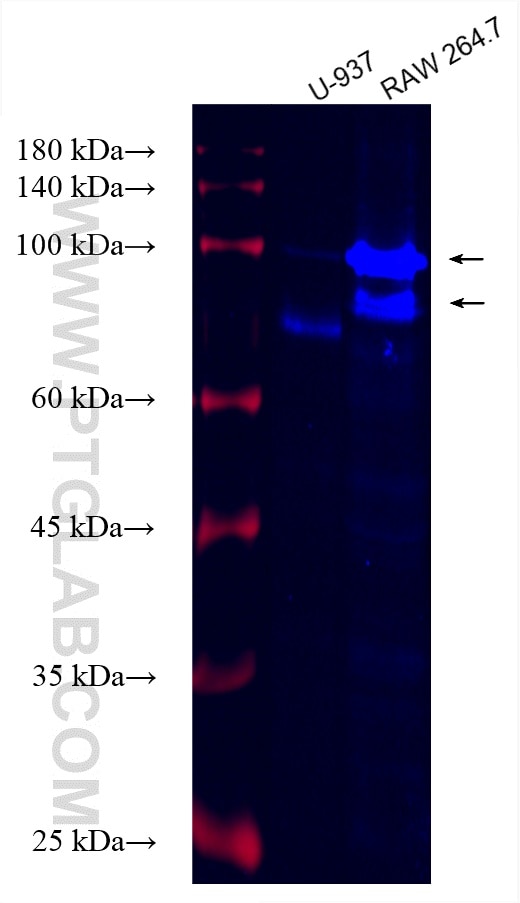CoraLite® Plus 750-conjugated CD68 Monoclonal antibody
CD68 Monoclonal Antibody for WB
Host / Isotype
Mouse / IgG1
Reactivity
human, mouse
Applications
WB
Conjugate
CoraLite® Plus 750 Fluorescent Dye
CloneNo.
3A9A7
Cat no : CL750-66231
Synonyms
Validation Data Gallery
Tested Applications
| Positive WB detected in | U-937 cells, RAW 264.7 cells |
Recommended dilution
| Application | Dilution |
|---|---|
| Western Blot (WB) | WB : 1:500-1:1000 |
| Sample-dependent, check data in validation data gallery | |
Product Information
CL750-66231 targets CD68 in WB applications and shows reactivity with human, mouse samples.
| Tested Reactivity | human, mouse |
| Host / Isotype | Mouse / IgG1 |
| Class | Monoclonal |
| Type | Antibody |
| Immunogen | CD68 fusion protein Ag22815 相同性解析による交差性が予測される生物種 |
| Full Name | CD68 molecule |
| Calculated molecular weight | 37 kDa |
| Observed molecular weight | 70-100 kDa |
| GenBank accession number | BC015557 |
| Gene symbol | CD68 |
| Gene ID (NCBI) | 968 |
| Conjugate | CoraLite® Plus 750 Fluorescent Dye |
| Excitation/Emission maxima wavelengths | 755 nm / 780 nm |
| Form | Liquid |
| Purification Method | Protein G purification |
| Storage Buffer | PBS with 50% Glycerol, 0.05% Proclin300, 0.5% BSA, pH 7.3. |
| Storage Conditions | Store at -20°C. Avoid exposure to light. Stable for one year after shipment. Aliquoting is unnecessary for -20oC storage. |
Background Information
CD68 is a type I transmembrane glycoprotein that is highly expressed by human monocytes and tissue macrophages. It belongs to the lysosomal/endosomal-associated membrane glycoprotein (LAMP) family and primarily localizes to lysosomes and endosomes with a smaller fraction circulating to the cell surface. CD68 is also a member of the scavenger receptor family. It may play a role in phagocytic activities of tissue macrophages.
Protocols
| Product Specific Protocols | |
|---|---|
| WB protocol for CL Plus 750 CD68 antibody CL750-66231 | Download protocol |
| Standard Protocols | |
|---|---|
| Click here to view our Standard Protocols |


